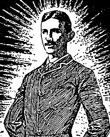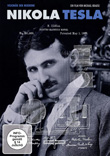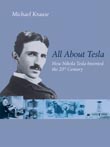Rebecca Cantrell, the New York Times bestselling author of the Order of the Sanguines and Joe Tesla series (http://www.rebeccacantrell.com), interviewing Michael Krause (http://www.michael-krause.org/), about the most recently completed documentary of Nikola Tesla entitled Nikola Tesla – Visionary of Modern Times.
Nikola Tesla is experiencing a resurgence in popularity recently, more than seventy years after his death, with TV shows, films, cartoons, and books all featuring him as a character. Why do you think he fascinates us so?
Tesla is a myth, and as such he is the perfect screen for our projections of a better, more content way of living. Furthermore, he envisioned our age in detail. And he lived the strange life of a loner, of a lone fighter for the betterment of mankind. And he spoke about that very freely, and he lived in the best hotels of the world. Tesla is a truly fascinating character.
He is indeed. What do you think inspires artists and scientists today about Nikola Tesla? What inspired you?All this geeky stuff, and of being a strange outsider in a world at the brink of a new era – today, we are in the same position, and many want to be heroes as Tesla was. My inspiration was that I wanted to find out about the real Tesla beyond the myth – and present a working over-unity machine at the end of the film. It didn’t come out that way because there is no over-unity machine, and perhaps there never will be, according to the physics we know of.
What surprises did you encounter while filming your documentary about his life and works?Biggest surprise was that the American border control already knew that I was coming. They greeted me by name. Tesla-wise I was surprised by all the people who do not question Tesla. Who think he was God-like, and, of course that he is not a superstar. Well, I think he is on his way to be one.
I loved the footage you shot of Nikola Tesla’s haunts. How did it feel to be walking in his footsteps all these years later–from his boyhood village in Smiljan to his hotels in New York to the museum in Belgrade that contains his ashes? Did you feel closer to him or further away?It was a very good feeling to touch Tesla base, so to speak. To feel and touch the places, for instance to realize that his rooms at the New Yorker Hotel are tiny, tiny. That Smiljan, his place of birth, is still a kind of magic place. And that New York City is still the place that takes in everybody full of ambition, from all around the world, and then he/she is just swallowed up. I think, personally, that although my ambition was to find the real Tesla, I did not succeed. He was a strange loner, and he always remain like that. Tesla’s persona will remain a myth.
Parts of the film dealt with a darker side to Nikola Tesla–taking money from investors for one project and spending it on another and, perhaps inadvertently, providing Nazi Germany with intelligence that led to the sinking of the Lusitania. Do you feel the Nikola Tesla lost his way later in life?Tesla lost contact to the emerging modern world at the beginning of the 20th century when his Wardenclyffe project failed. Technology and science developed further, but Tesla remained the same. Those developments—for instance quantum mechanics, astronomy, cosmology—do paint a much more detailed, and a really much bigger picture of the universe and its ingredients. That is good. How all that machinery really works, we still don’t know. And at that point, I think, we could well adopt some of Tesla’s ideas for the next steps of mankind.
I noticed an intriguing project on your website that was totally unrelated to Nikola Tesla—a film called Berlin Zombies. What is that about, and when is it due to be released?Berlin Zombies is in the early phases of development. It’s a comedy drama with happy zombies, and they become superstars. It’s been called “The Rocky Horror Picture Show meets Shaun of the Dead.”
What are you working on next?I don’t know yet. For the next two or three weeks I will have to finish the German version of the CERN film. Lots to do.




![Pageflex Persona [document: PRS0000448_00039]](http://www.allabouttesla.com/teslablog/wp-content/uploads/2015/02/The-Tesla-Legacy-Medium-Kopie-300x164.jpg)






